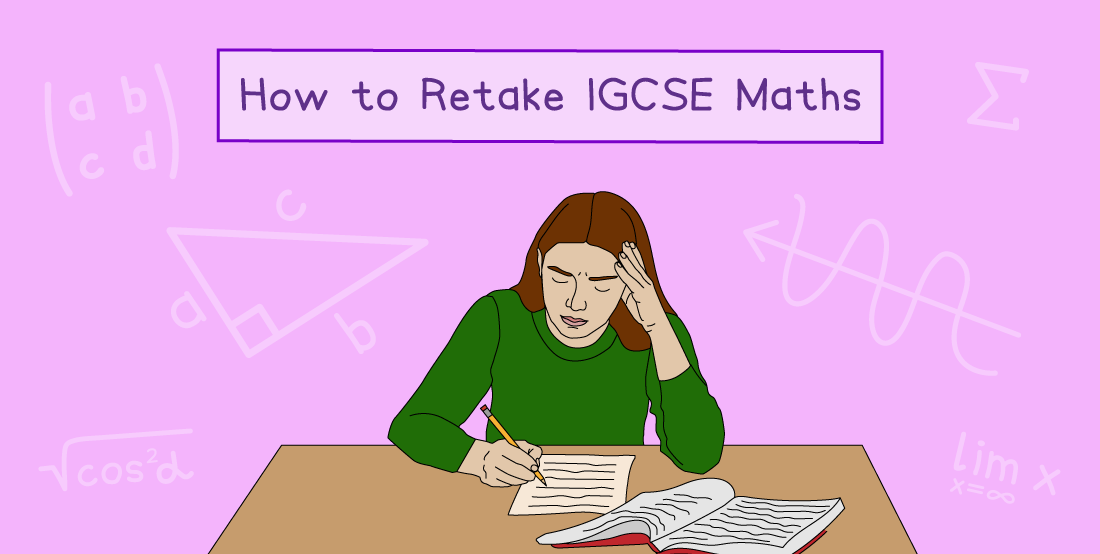Contents
If you’re reading this, you’re probably thinking about resitting your IGCSE Maths exam. First of all: you’re not alone, and this is not the end of the road.
As a secondary school exam resitter myself, I know from personal experience that setbacks like this can feel frustrating and disheartening. But they’re also a valuable opportunity to regroup, refocus, and come back stronger.
In this article, I’ll walk you through everything you need to know about resitting IGCSE Maths, including when to resit, how the process works, the different options available to you, and how to give yourself the best possible chance of success the second time around.
Whether you're taking Edexcel IGCSE Maths or CIE IGCSE Maths, you'll find clear guidance and practical advice here to help you move forward.
When to Resit Your Exam
Resitting your IGCSE Maths exam makes the most sense if you know you can improve your grade with better preparation, clearer understanding, and more practice. Perhaps you narrowly missed the grade you needed for your next step, whether that’s Sixth Form, college, or a particular course requirement. Or maybe you just want to prove to yourself that you can do better.
There’s no shame in resitting. In fact, many students achieve significantly better results the second time around. If you know what held you back the first time (whether it was nerves, revision gaps, or time pressure), then you’re already in a stronger position.
The Resit Process for IGCSE Maths
The exact steps can vary depending on whether you're taking Edexcel or CIE, but the general process follows a similar pattern. Here's what to expect:
Step 1: Decide Which Exam Board You’re Resitting
Most students stick with the same exam board they originally sat — either Edexcel or CIE — but it is possible to switch. Be aware that the specifications differ slightly, so switching might require extra preparation. If you're unsure which board you sat, check your original results or ask your school or tutor.
Step 2: Choose How You’ll Resit
Some students resit through their school if the school offers that option. Others register as private candidates through an approved exam centre. Private candidates are responsible for their own exam registration, fees, and preparation, although some use tutors or online platforms to help.
If you're a UK student who’s left school, you might also resit via a college or sixth-form centre, or even alongside other A Level or vocational courses.
Step 3: Register for the Exam
If you are resitting as a school or college student, then your school may take care of the resit registration for you. If you are registering on your own, however, you must register with an approved exam centre that accepts private candidates. This usually includes:
Filling in a registration form
Paying the exam fee
Submitting identification and other paperwork
Registration deadlines vary, but they often fall several months before the exam date, so check early. Exam centres often post their registration information on their websites.
Edexcel Private Candidate Info
CIE Private Candidate Info
Step 4: Prepare for the Exam (and Learn from Last Time)
The key to doing better in your resit is understanding what went wrong the first time, and making changes. Focus your revision on the areas where you struggled, and use new resources, tools, or support if needed. We’ll go into more revision strategies further below.
Step 5: Sit the Exam
IGCSE Maths exams usually happen in May/June and sometimes in October/November, depending on the board and the country. Once you're registered, the exam centre will give you your timetable and instructions.
Different Ways to Resit
There’s no single “correct” route to a resit – it depends on your situation, resources, and support network. Here are the most common options:
Resitting Through Your School
If your school offers resit support and is willing to enter you again for the exam, this can be the easiest option. You’ll have access to your teachers, school resources, and a familiar environment. But not all schools offer this, especially if you've already left.
Resitting as a Private Candidate
You can register for the exam independently through an approved centre. This gives you full control over your preparation and scheduling, but also means you need to organise your own revision and resources. Many private candidates use online platforms (like Save My Exams!) to guide their studies.
Getting a Private Tutor
A tutor can give you tailored, one-to-one support and help you identify exactly where you went wrong, as well as how to improve. This can be a great option if you're motivated but need extra guidance, or if you're switching exam boards.
Self-Studying at Home
Some students choose to study independently using textbooks, online resources, and past papers. This requires discipline and structure, but it also gives you full flexibility. Combining self-study with high-quality resources (see below for suggestions) can be very effective.
Strategies to Excel in Your IGCSE Maths Resit
If you’re going to put the effort into a resit, it makes sense to approach it smarter, not just harder. Here are some tried and tested strategies:
Review Your Past Exam Paper
Look at your old exam paper and feedback (if you have it). Try to spot any patterns: Did you run out of time? Were there whole topics you didn’t understand? Were marks lost to small mistakes?
Prioritise Weak Areas
Once you know what needs work, focus your revision on those topics. There's no need to redo everything from scratch. Instead, target the areas that cost you the most marks.
Practice With Timed Past Papers
Exam technique is just as important as knowledge. Set a timer, simulate exam conditions, and practise working under pressure. Use the official past papers from Edexcel and CIE.
Use Targeted Revision Resources
Don’t waste time on generic resources. Use tools specifically designed for your exam board and course. Save My Exams offers topic-based revision notes, model answers, and worked solutions tailored to Edexcel and CIE IGCSE Maths.
Set a Revision Schedule
Make a realistic plan, not just for what you’ll study, but when. Spreading out your revision over weeks or months is far more effective than cramming at the end.
Resources and Support Available
You’re not on your own — there are plenty of tools and people who can help you prepare for your resit:
Your teacher (if you're still at school) – Ask for help understanding past mistakes or reviewing key topics.
Private tutors – Offer tailored help and can work around your schedule.
Revision websites – Platforms like Save My Exams offer structured resources aligned to Edexcel and CIE IGCSE Maths specifications.
Video-sharing websites – There are lots of free explainer videos and walkthroughs.
Textbooks and revision guides – Make sure they match your specification.
Study groups or online forums – Learning with others can help motivation and deepen understanding.
Other Considerations
How Much Does a IGCSE Maths Resit Cost?
The cost varies depending on the exam board and the centre you register with. On average:
Edexcel: ~£120–£170 per subject
CIE: ~£110–£160 per subject
These are typical UK-based private candidate fees; international costs may vary. Some centres may also charge additional admin fees on top of that, so the total cost may be higher.
Edexcel Fees Info
CIE article on exam fees
When is The Deadline for IGCSE Maths Resits?
Deadlines vary slightly depending on the series:
For May/June exams: Entries usually close by mid-February to early March
For October/November exams (if available): Entries typically close by mid-August to early September
Always check with your chosen exam centre, as they may have earlier internal deadlines.
Edexcel Key Dates
CIE Key Dates
Next Steps After The Resit
Step 1: Wait for Your Results
After sitting the exam, results are usually released:
August (for May/June series)
January (for October/November series, if applicable)
Check your exam board’s website or exam centre for specific release dates.
Step 2: Review and Reflect
If you passed – congratulations! Take a moment to reflect on your hard work and what helped you succeed. If you didn’t get the result you wanted, don't panic. You still have options, including a further resit or other qualifications.
Step 3: Use Your New Grade to Move Forward
Whether you’re heading to Sixth Form, college, university, or the workplace, your new grade can open doors. IGCSE Maths is a core subject, so improving your grade here is a smart move for almost any future path.
Final Thoughts
Resitting IGCSE Maths might not have been part of your original plan – but it can be the turning point that sets you up for greater success down the line. With the right preparation, resources, and mindset, you can do better next time.
And remember: there are plenty of students just like you (and me) who have been in your shoes and come out stronger for it.
Boost Your Grades With Save My Exams
Feeling stressed ahead of your exams? Join over 1.5 million students who use Save My Exams, the leading online revision platform.
On average, students who use Save My Exams improve by two grades thanks to our comprehensive resources. From past papers and revision notes to exam-style questions tailored to your specific course, our revision tools help you to study smarter, not harder.
Created by teachers and examiners who know exactly what you need to revise to achieve the best grades, our resources help students to save time and get straight to the content you need.
Explore Our IGCSE Maths Revision Resources
References
CIE article on exam fees
CIE Key Dates
CIE Private Candidate Info
Edexcel Fees Info
Edexcel Key Dates
Edexcel Private Candidate Info
Sign up for articles sent directly to your inbox
Receive news, articles and guides directly from our team of experts.

Share this article



 written revision resources that improve your
written revision resources that improve your